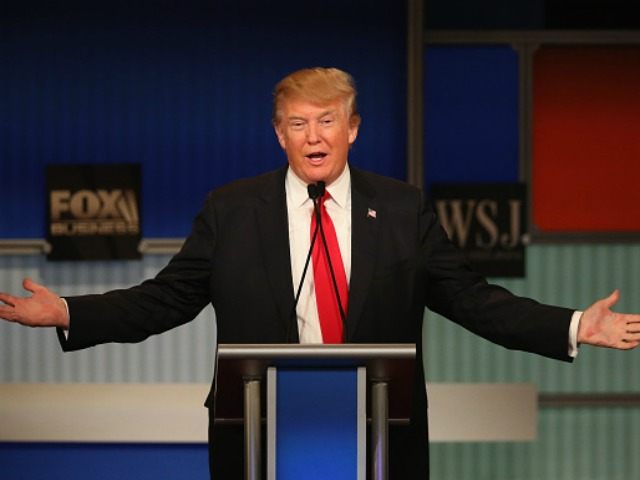In Tuesday nights’s Republican debate, Donald Trump further distinguished himself from the other top-polling GOP presidential candidates by expressing his adamant opposition to the massive 5,554-page TransPacific Partnership (TPP) agreement.
“The TPP is a horrible deal,” Trump declared. “It is a deal that is going to lead to nothing but trouble.”
Trump said:
This is one of the worst trade deals. And I would… rather not have it. With all of these countries, and all of the bad ones getting advantage and taking advantage of what the good ones would normally get, I’d rather make individual deals with individual countries. We will do much better. We lose a fortune on trade. The United States loses with everybody. We’re losing now over $500 billion in terms of imbalance with China, $75 billion a year imbalance with Japan. By the way, Mexico—$50 billion a year imbalance. So I must say… I just think it’s a terrible deal.
Polls show that Trump’s opposition to globalist trade pacts places him firmly in the center of the mainstream of the GOP electorate. According to Pew, by a nearly five-to-one margin, Republican voters believe so-called free trade deals will slash wages rather than raise them. Only a minuscule 11 percent of Republican voters believe that they will raise wages.
While Trump declared his adamant opposition to Obamatrade, Sen. Marco Rubio has previously-endorsed TPP and declared it to be one of the “pillars” of his hoped-for Rubio presidency.
In an April 29th, op-ed in the Wall Street Journal, Rubio wrote: “We must rebuild our own military capabilities, conclude and pass TPP, and renew our support for freedom and the rule of law in Asia.”
In a May 13th address to the Council on Foreign Relations, Rubio described TPP as the “second pillar” of his three-pillar foreign policy and declared: “It is more important than ever that Congress give the president [Barack Obama] trade promotion authority so that he can finalize the Trans-Pacific Partnership.”
After these declarations, Rubio then voted to fast-track the Trans-Pacific Partnership so that Obama’s trade deals could be passed without a filibuster, without amendment, or without the possibility of a 67-vote treaty threshold in the U.S. Senate.
In Tuesday night’s debate, Trump pointed out the deal—now on fast-track—is nearly “5,600 pages long” and is “so complex that nobody’s read it. It’s like Obamacare—nobody ever read it,” Trump said.
Indeed, while then-House Ways And Means Chairman Paul Ryan was pushing Obamatrade through the House, he said that the American people could not see the bill until it was already agreed to—declaring it will be, “declassified and made public once it’s agreed to.”
As Breitbart News has previously reported, the trade deal is larger than the size of ObamaCare and the Rubio-Obama amnesty bill combined.
When asked specifically what he opposes about the deal, Trump pointed to the deal’s failure to address currency manipulation. Trump said:
The currency manipulation, they don’t discuss in the agreement, which is a disaster. If you look at the way China and India and almost everybody takes advantage of the United States… If you look at the way they take advantage, it’s through currency manipulation. It’s not even discussed in the almost 6,000-page agreement. It’s not even discussed… It’s a very bad deal—should not be approved. If it is approved, it will just be more bad trade deals, more loss of jobs for our country. We are losing jobs like nobody’s ever lost jobs before. I want to bring jobs back into this country.
While Trump wants the deal to include measures to address currency manipulation, Sen. Rubio voted against including the Portman-Stabenow amendment to the TPP, which would have tackled currency manipulation. Portman explained that his amendment would have added language designed to prevent foreign competitors from using “their exchange rates to subsidize their exports at the expense of products made by American workers.”
As the president of the Steelworkers Union recently observed, “Between 1997, three years after NAFTA took effect, and 2014, the country lost more than 5 million manufacturing jobs… Just since 2001, 56,000 American factories closed.”
The president of the Steelworkers Union continued:
Unemployed, desperate and despairing, these once-middle-class workers are killing themselves at unconscionable rates with guns, heroin and alcohol-induced cirrhosis… Bread winners couldn’t pay their bills and couldn’t foresee a future when they could. That is because jobs in manufacturing and construction – jobs that had provided middle-class incomes for workers without college degrees for decades – disappeared.
Interestingly, while WSJ‘s Gerard Baker seemed to defend the TPP, none of the moderators asked any of the other candidates about whether they supported the controversial trade pact. This was the first debate since the TPP text was made public, and the decision not to ask anyone about it other than Trump—whose position is already known—may come under scrutiny.
This will also mark the fourth straight debate where Senator Rubio was asked neither about his past statement on TPP or his work authoring the Gang of Eight bill. According to Sen. Jeff Sessions, the GOP nominee must not select any nominee who supports amnesty or TPP as Senator Rubio does: “I don’t think a Republican candidate should be running for President that says they’re for amnesty, for even more immigration, and for trade agreements that don’t serve the national interest.” Similarly, on Tuesday night, Ted Cruz warned that the GOP would lose the general election if it nominated a pro-amnesty candidate.

COMMENTS
Please let us know if you're having issues with commenting.